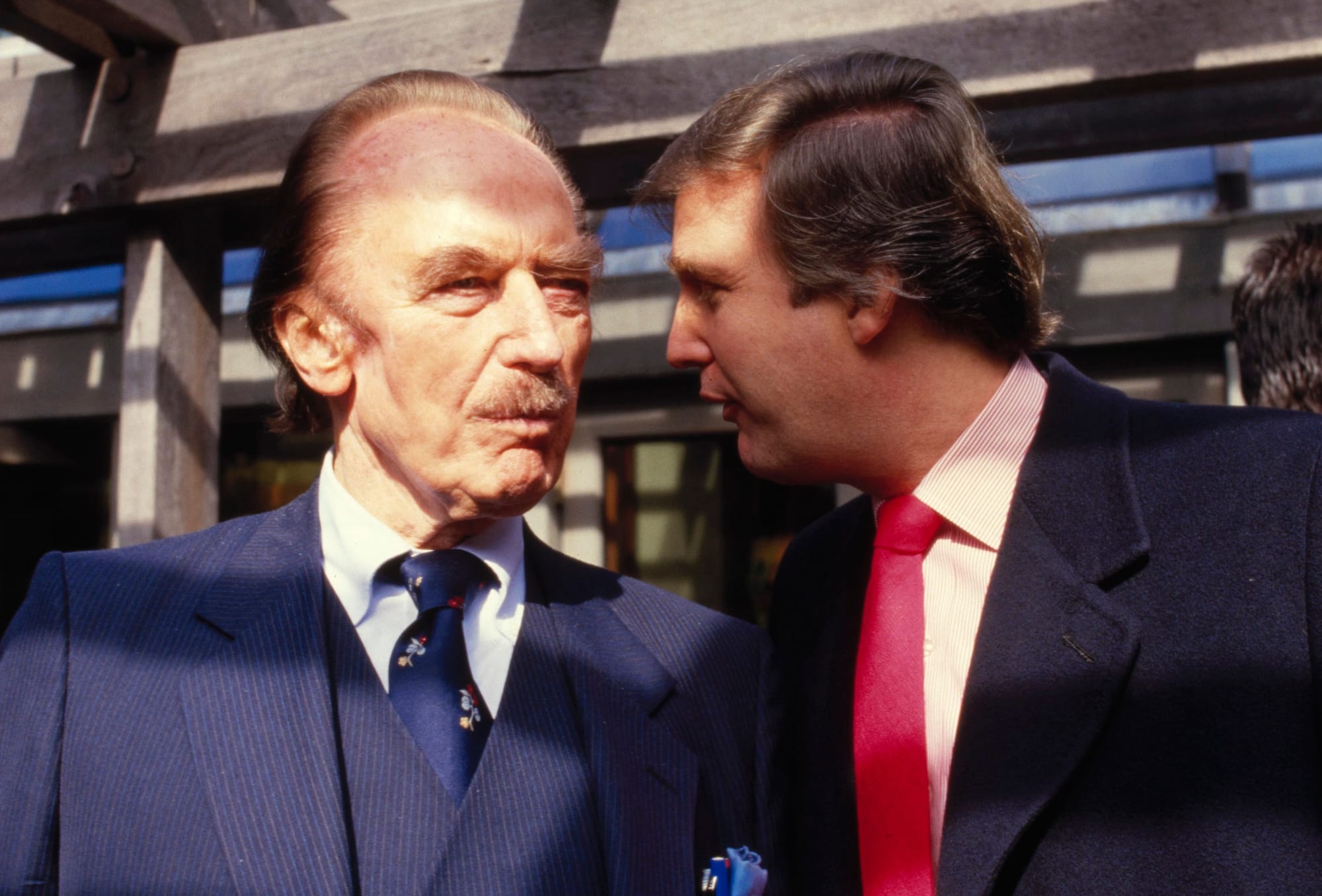
“Turning 50 does make you think about mortality, or immortality, or whatever,” Donald Trump told Playboy magazine in 1997. “It does hit you.”
Seeing his father “addled with Alzheimer’s,” he told Playboy, had caused him to wonder “out loud about the senselessness of life.”
That wondering didn't, however, stop Trump from "dismissing and deriding" his father during his final years, according to Trump's niece Mary Trump in her 2020 memoir.
Mary Trump also wrote that Trump was visibly upset at one family gathering at Mar-a-Lago in the mid-1990s where, according to The Washington Post, Fred "didn’t recognize two of his children at the party... when he did recognize Donald, the family patriarch approached his son with a picture of a Cadillac that he wanted to buy — as if he needed his son’s permission."
Fred Trump was originally diagnosed with "mild senile dementia" in 1991, when his son Donald was 45. He died in 1999, at the age of 93, shortly after Donald's 53rd birthday.

Fred Trump's obituary in The New York Times noted that he had been diagnosed with Alzheimer's in 1993.
It's now more than 30 years since Fred Trump was first diagnosed with dementia, and 25 years since he died from Alzheimer's.
Since the 1990s, there have been great advances in our understanding of Alzheimer's and dementia, and how it can be prevented, detected and treated. But at the time Donald Trump was observing his father's accelerating mental decline, the connection between Alzheimer's and a variety of "modifiable lifestyle behaviors" was much less understood.
In the 1990s, it was assumed that genetics and age played a key role—but significant advances in genetic testing and diagnostics still lay ahead. Back then, there was also widespread discussion that aluminum in anti-perspirants was a contributing factor, although that connection has never been confirmed by reliable studies.
In recent years, 12 lifestyle behaviors have been shown to account for 40% of worldwide dementias "which could otherwise could have been prevented or delayed."
It's clear, though, that if Trump sought or was offered any advice about lifestyle changes that could diminish the threat of him developing dementia or Alzheimer's, he did not take it.
How Trump Could Have Lowered His Risk of Dementia
According to the National Institute on Aging:
Alzheimer’s does not have a single genetic cause. Instead, it can be influenced by multiple genes in combination with lifestyle and environmental factors.
The two biggest risk factors related to Alzheimer's are considered to be: 1) Advanced age; and 2) A family history of the disease.
According to NBC News, the seven basic lifestyle recommendations the Mayo Clinic now offers for lowering the risk of dementia are: "eating a balanced diet, exercising regularly, not drinking alcohol, sleeping well, and maintaining healthy weight, blood pressure and cholesterol levels." On that list, Trump only checks one box, for not drinking alcohol.

In summary: At the age of 77, Trump clearly has both of the main risk factors for Alzheimer's, namely, advanced age plus family history. In addition, there is voluminous evidence that he's at higher risk based on six of the seven key lifestyle factors known to contribute to Alzheimer's. (Reminder: By 2018, White House doctor Dr. Ronny Jackson had seen enough to think it prudent to give Trump a screening for dementia.)
The Lifestyle Factors That Increased Trump's Dementia Risk
As someone who has bragged about his "good genes" and fascination with genetic superiority and bloodlines, it would be hard to imagine that Trump did not contemplate the prospect that he would one day be afflicted with the same disease that destroyed his father.
It's possible that Trump responded to his father's illness by doubling down on his "devil may care" attitude to life, assuming that his fate regarding Alzheimer's would be decided entirely by genetics and aging.
Throughout the 1990s and 2000s, Trump maintained a highly visible "playboy" life, partying openly with sex traffickers and child rapists, stuffing his face with cheeseburgers, harassing and physically assaulting numerous girls and women, and not getting anything close to the 7-9 hours of nightly sleep now recommended to flush waste and debris out of the brain.
Here are some of the ways his poor lifestyle habits could help explain the rapid, late-in-life mental decline many experts are now observing:
Diet
Trump has a notoriously bad, fast-food and steak-heavy diet and an almost legendary addiction to Diet Coke.

According to The New York Times, diners at the Trump White House could expect “well-done steak, salad slathered with Roquefort dressing and bacon crumbles, tureens of gravy and massive slices of dessert with extra ice cream.” At other times, as Daily Mail noted: "His go-to meal is two Big Macs, two Filet-O-Fish and a chocolate malted milkshake."
The science: Research indicates that eating fast food on a regular basis could cause memory problems and long-term damage to the brain. One 2017 study found that drinking diet sodas increased the risks of stroke and dementia. (Then again, when Trump tries to drink water, it never goes well.)
Exercise
Trump has always had a hate-hate relationship with exercise, based on his conviction that the human body is like a battery, with a finite amount of energy, which exercise only depletes.
White House physician (and pill-supplier) Dr. Ronny Jackson notoriously tried and failed to get Trump onto an exercise bike or elliptical machine.
And that means Trump's only known form of exercise is getting in and out of a golf cart. He's so lazy (or scared of potential ramps) that in 2017, when leaders at a G7 meeting had to walk 700 yards for a photo op, he followed in a golf cart.
The science: According to the Alzheimer's Society: "A lack of physical exercise is one of the main factors where the evidence is strong enough to show that it increases a person’s risk of developing dementia. Studies looking at the effect of exercise in middle-aged or older adults have reported improvements in thinking and memory, and reduced rates of dementia."
Weight
Trump has a long history of verbally abusing others about their weight, possibly because of his own sensitivity on the issue.

His sensitivity on the issue is assumed to have led Dr. Ronny Jackson to add an inch to Trump's height in 2018—making the then-President officially as tall as Alex Rodriguez—in an effort to avoid Trump being called obese, spawning the "Girther movement."
After his 2018 Presidential physical, Dr. Jackson told Trump he needed to lose 10-15 pounds. Instead Trump gained four, tipping the scales at 243 pounds in 2019, making him officially obese, even when standing A-Rod tall.
The science: According to the Alzheimer's Society: "Obesity is associated with an increase in dementia risk. This could be because of its link to diabetes, high blood pressure and inflammation.... Research has shown a relationship between BMI and brain size in people around the age of 60... increased brain shrinkage associated with obesity has been suggested by some to age the brain by around 10 years."
Blood Pressure
Trump went to great lengths to conceal his health records before he became President. While President, his blood pressure was shown to be elevated.
Trump's elevated blood pressure levels were found despite him being on two medications known to lower blood pressure—statins for high cholesterol and a daily aspirin to prevent heart attacks.
The science: Multiple studies have shown that high blood pressure is associated with declining brain function. According to Johns Hopkins Medicine: "High blood pressure can damage small blood vessels in the brain, affecting parts of the brain responsible for thinking and memory."
Cholesterol
Trump's 2018 White House physical showed total cholesterol at 223, despite the fact he was already taking the statin drug Crestor to help lower so-called “bad” cholesterol and fats. A year later, on a higher dose of Crestor, Trump’s total cholesterol was down to 196, but his LDL (“bad” cholesterol) remained elevated at 122. Given an even higher dose between 2019 and 2020, he was declared in normal range in 2020.
The science: High levels of cholesterol are known to associated with an increased risk of Alzheimer's, especially because cholesterol is often accompanied by obesity and high blood pressure. Assuming Trump has suffered from high cholesterol since middle-age, we now know that's a particularly bad thing. “Having high cholesterol may not cause Alzheimer’s, but it presses the fast-forward button on the disease pathology and cognitive decline," brain-health specialist Dr. Richard Isaacson told CNN.
Sleep
Back when it was fashionable to do so, Trump frequently bragged about his ability to get by on just 3-4 hours of sleep per night. In 2018, Dr. Ronny Jackson said Trump slept 4-5 hours a night and that he was "just one of those people, I think, that just does not require a lot of sleep.”
But quality sleep is one of the pillars of reducing dementia risk, both for flushing out toxins and preventing the buildup of beta-amyloid, "a sticky protein that can further disrupt the deep sleep necessary for memory formation."
On top of all the risk factors that could be accelerating Trump's mental decline, it seems reasonable to think that a simple lack of sleep—possibly aggravated by Trump's excessive Diet Coke consumption and multiple medications—could be making his feeble mental state a whole lot worse.
The science: "Inadequate sleep duration could increase dementia risk," writes the NIH. "People who slept six hours or less per night in their 50s and 60s were more likely to develop dementia later in life." One recent study found that "as little as a 1% reduction in deep sleep each year for people over 60 years of age equals a 27% increased risk of developing dementia."
Trump in 2024
Today Donald Trump, Jr. is, at age 46, about the same age his father was when Donald Trump first became aware of his dad Fred's mental decline. (At which point, Trump immediately tried to manipulate Fred Trump and screw over the rest of his family.)
Despite Trump's visible mental glitches, public "sundowning" and more frequent incoherence, none of Trump's adult children—Don, Jr., Eric, Ivanka and Tiffany—are willing to acknowledge their own father's visibly feeble mental state. Only niece Mary Trump, a trained psychologist, has spoken about the former president's "much-lessened ability to be coherent for any length of time."

While a growing number of psychologists and medical professionals are speaking out about Trump's possible dementia or Alzheimer's, "MAGA voters don't notice or don't care," wrote Amanda Marcotte in Salon in March 2024.
But beyond Trump's MAGA base, even people not paying close attention are being made aware of his verbal deterioration, brain glitches, foot dragging and other issues.
Excessive daytime sleepiness is one of the symptoms of dementia. Multiple reports from inside the Manhattan courtroom where Trump currently on trial for election interference crimes indicate he is consistently unable to stay awake (and, apparently, farting).
Probably not helping: The Daily Mail reports that Trump's team are dropping major Benjamins at McDonald's near the courthouse on their daily fast-food runs.

Given Trump's already visible deterioration it may be too late for him to meaningfully change his ways to slow the decline.
But for the rest of us, it seems the best way to ward off dementia or Alzheimer's would be to pay attention to what Trump does, then do the opposite.
Thanks to my paid subscribers, this newsletter comes to you ad-free and with no paywall. If you haven't already, please sign up now to get future issues delivered free by email... or, if you can, support with a paid annual subscription for just $2/month.
Subscribe to Unprecedented
Subscribe to the newsletter and unlock access to member-only content.